Top Features of Microsoft Fabric Every Data Professional Should Know
The modern era demands tools that simplify complex workflows, and Microsoft Fabric stands out as a transformative solution for data professionals. By unifying vast amounts of data into a single platform, Fabric eliminates silos and streamlines processes. Its top features empower you to manage, analyze, and visualize data with ease, enabling faster and more informed decision-making. With its ability to integrate seamlessly across analytics tools, Fabric ensures that your data remains accessible and actionable. This marks a true Data Revolution with Microsoft Fabric, redefining how you approach analytics and data management.
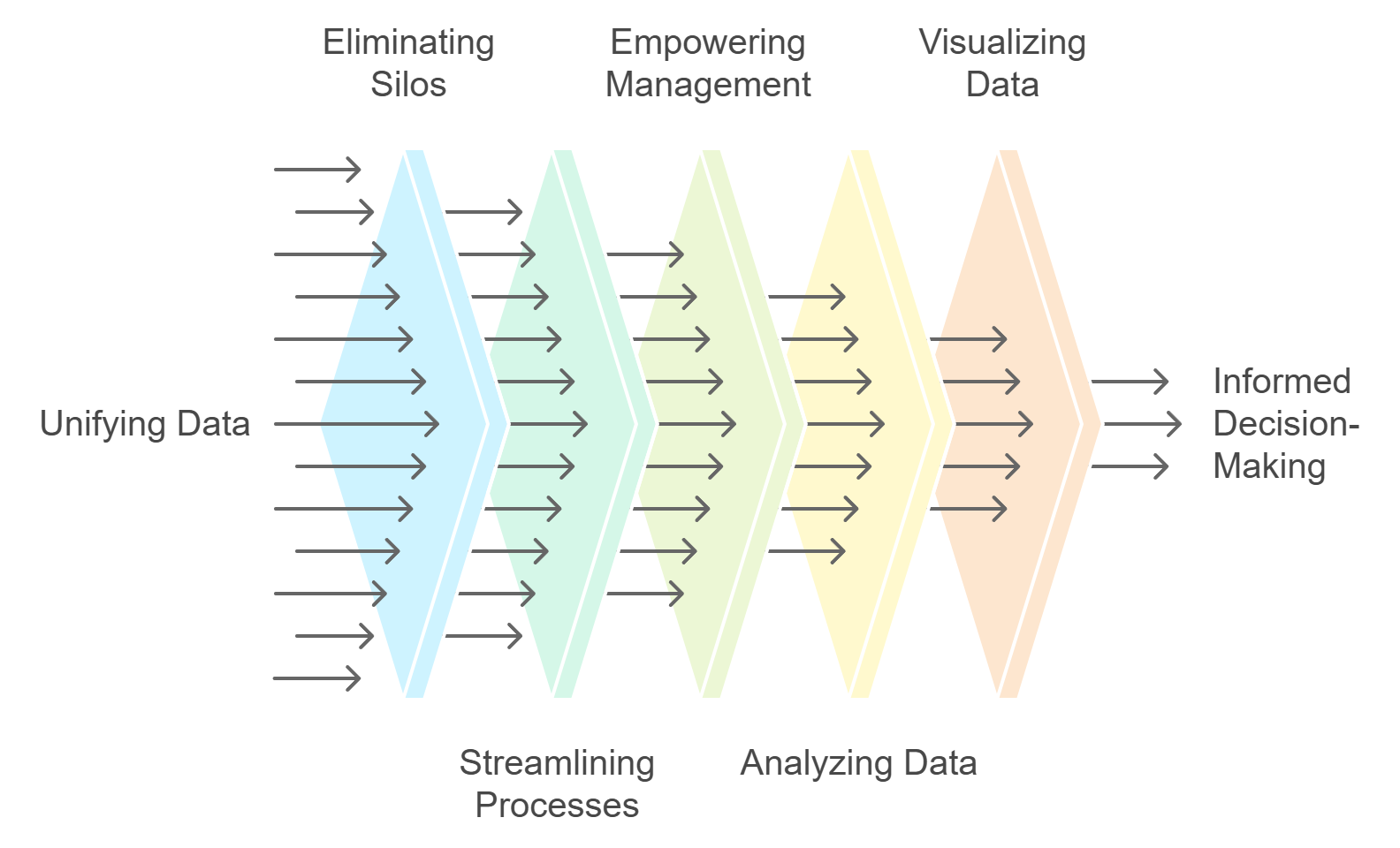
Key Takeaways
Microsoft Fabric unifies data management by integrating various data services into a single platform, simplifying workflows and enhancing collaboration.
OneLake serves as a centralized data lake, ensuring consistent access to both structured and unstructured data, which streamlines data discovery and management.
Real-time analytics capabilities allow businesses to act on insights immediately, improving responsiveness and decision-making in fast-paced environments.
Embedded machine learning models in Fabric make predictive analytics accessible, enabling users to forecast trends without extensive technical knowledge.
Natural language querying democratizes data exploration, allowing non-technical users to extract insights easily and contribute to data-driven decisions.
Role-based access control enhances data security and compliance, ensuring that sensitive information is only accessible to authorized users.
The pay-as-you-go pricing model and elastic scalability of Microsoft Fabric help organizations manage costs effectively while adapting to varying data workloads.
Unified Data Platform
Integration Across Data Services
A unified platform is essential for managing and analyzing data efficiently. Microsoft Fabric excels in this area by offering seamless integration across various data services. It connects data engineering, data science, and analytics into a cohesive workflow. This eliminates the need for multiple tools and reduces the complexity of managing separate systems.
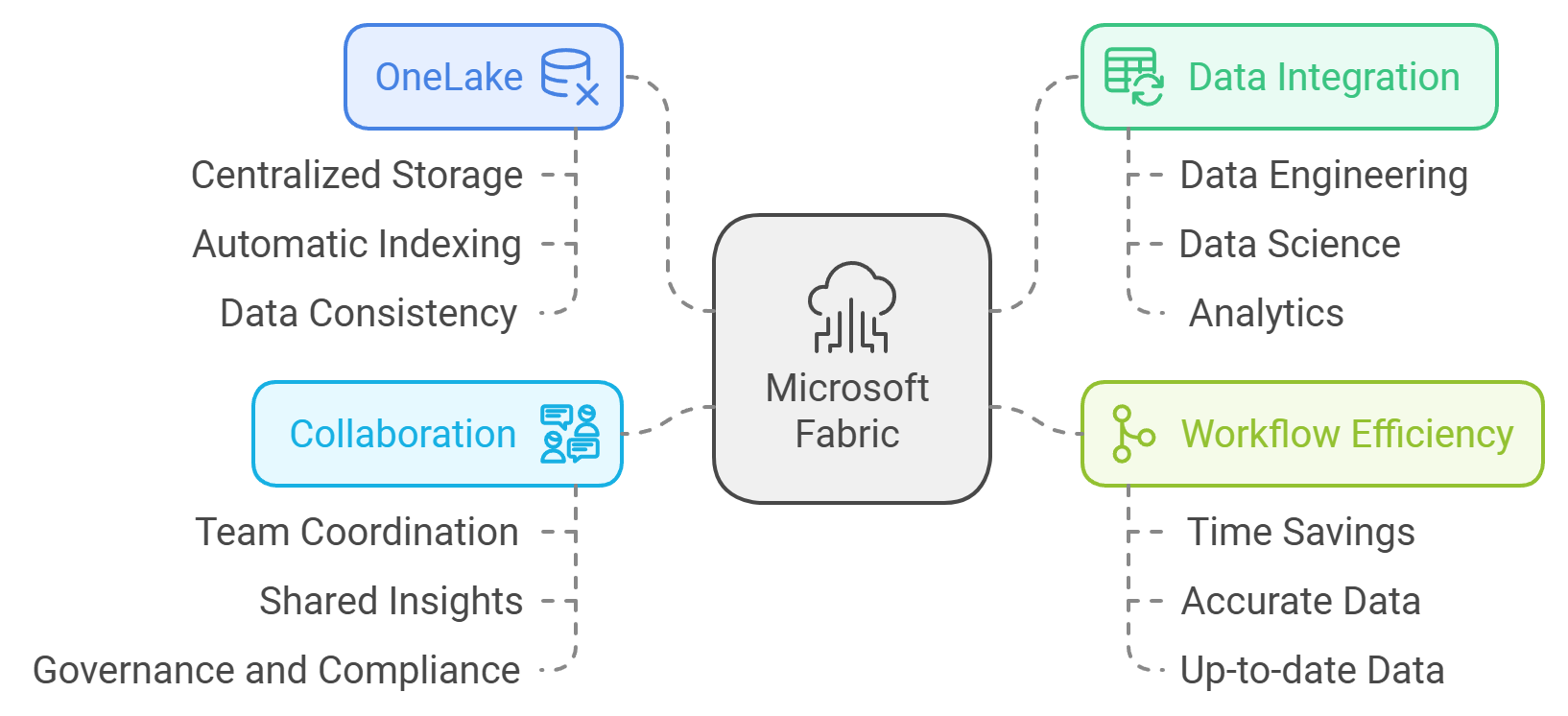
At the heart of this integration lies OneLake, a centralized data lake that simplifies storage and access. OneLake acts as a single repository for all your data, ensuring consistency and accessibility. Whether you are working with structured or unstructured data, OneLake provides a unified solution. It also supports automatic indexing, making it easier to discover and manage your data assets. This feature empowers you to focus on deriving insights rather than dealing with fragmented storage systems.
"OneLake serves as the central hub for all data within Microsoft Fabric, automatically indexing data for easy discovery, sharing, governance, and compliance."
By centralizing your data, you can streamline workflows and enhance collaboration across teams. This approach not only saves time but also ensures that your data remains accurate and up-to-date.
Cross-Platform Compatibility
In today’s diverse technological landscape, compatibility across platforms is crucial. Microsoft Fabric addresses this need by supporting multiple data sources and cloud environments. Whether your data resides in on-premises systems, third-party services like S3, or other cloud platforms such as GCP, Fabric ensures seamless integration. This flexibility allows you to unify your data estate without worrying about compatibility issues.
Fabric also integrates effortlessly with tools like Microsoft Power BI, Azure Synapse, and Azure Data Factory. These integrations enable you to leverage the full potential of your data. For instance, you can use Power BI for advanced visualizations, Azure Synapse for analytics, and Azure Data Factory for data orchestration. This interconnected ecosystem enhances productivity and ensures that your data workflows remain efficient.
By providing cross-platform compatibility, Fabric empowers you to break down silos and create a unified data strategy. This capability is especially valuable for organizations that rely on diverse data sources and need a centralized platform to manage them effectively.
Real-Time Analytics
Built-In Streaming Capabilities
In the fast-paced world of modern business, the ability to process data as it arrives is a game-changer. Microsoft Fabric equips you with built-in streaming capabilities that enable real-time data ingestion and processing. This feature ensures that you can act on insights as they emerge, rather than waiting for batch processing cycles to complete. Whether you're monitoring customer behavior, tracking supply chain metrics, or analyzing financial transactions, real-time data keeps you ahead of the curve.
Fabric's support for event-driven architectures further enhances its utility. By responding to specific triggers or events, you can automate workflows and make your systems more efficient. For example, you can set up alerts for unusual patterns in sales data or automatically update dashboards when new information becomes available. These capabilities transform how you interact with your data, making your operations more agile and responsive.
"Real-time analytics experiences are no longer optional; they are essential for businesses aiming to stay competitive in a data-driven world."
With Microsoft Fabric, you gain the tools to harness the power of real-time analytics, ensuring that your decisions are always based on the most current information available.
Advanced Query Performance
Efficient data analysis requires more than just access to information; it demands speed and scalability. Microsoft Fabric delivers on both fronts with its optimized query execution. This feature allows you to extract insights quickly, even from large and complex datasets. By reducing query latency, Fabric ensures that you spend less time waiting and more time acting on valuable insights.
The platform's scalable architecture is another standout feature. As your data grows, Fabric scales seamlessly to handle increasing workloads. This elasticity ensures that your analytics processes remain smooth, regardless of the volume of data you're working with. Whether you're analyzing a small dataset or processing terabytes of information, Fabric adapts to meet your needs.
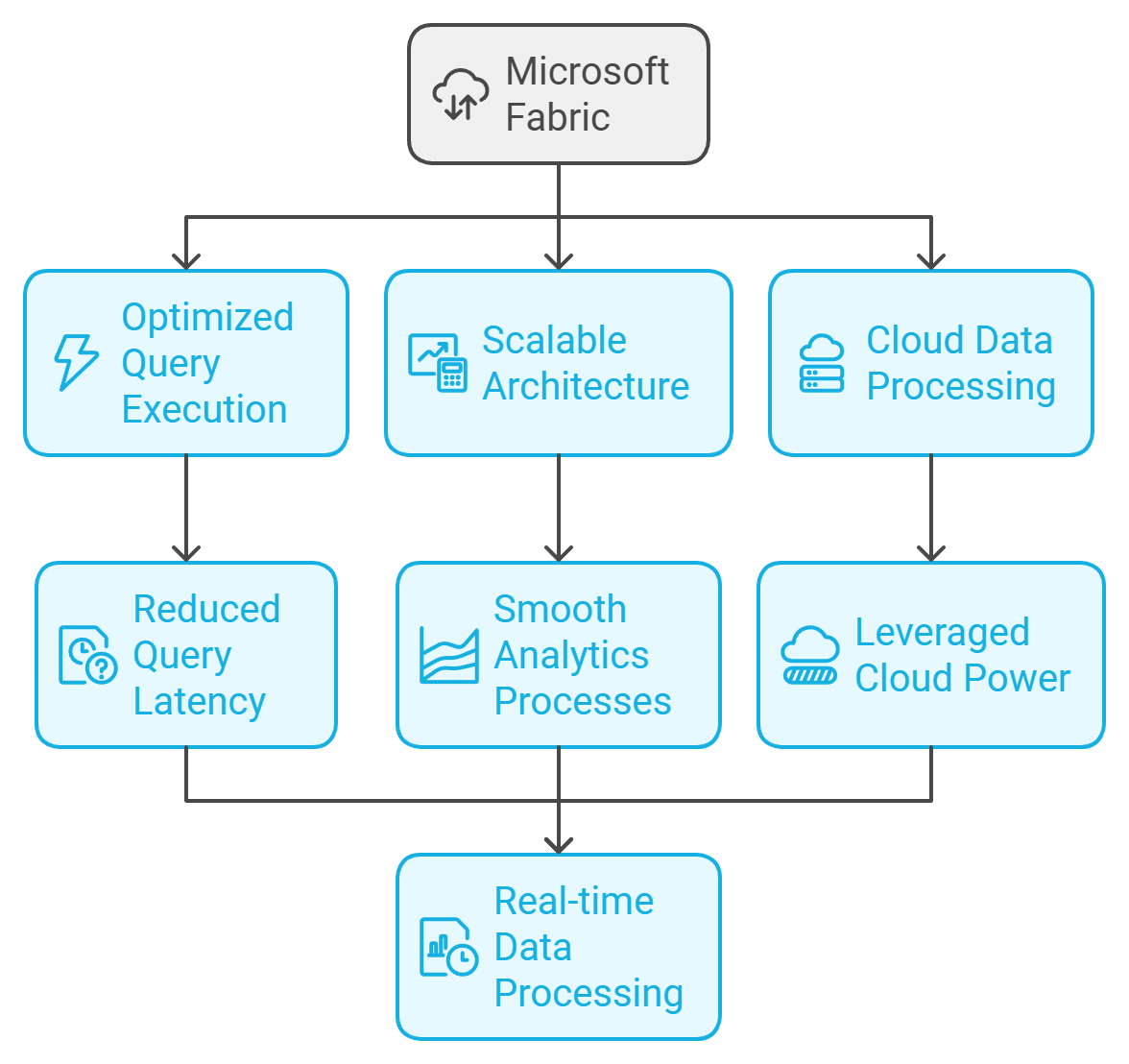
Fabric's advanced query performance also supports cloud data processing, enabling you to leverage the power of cloud computing for your analytics tasks. This capability not only enhances performance but also provides the flexibility to work with data stored across various environments.
By combining real-time data processing with advanced query performance, Microsoft Fabric empowers you to unlock the full potential of your data. These features ensure that your analytics workflows are not only fast but also scalable and reliable.
AI-Powered Insights
Embedded Machine Learning Models
Microsoft Fabric empowers you to harness the potential of machine learning with its embedded models. These pre-built models simplify predictive analytics, enabling you to forecast trends and make informed decisions without requiring extensive technical expertise. Whether you're predicting customer behavior or optimizing supply chain operations, these models provide actionable insights that drive better outcomes.
For more specific needs, Fabric allows seamless integration of custom machine learning models. You can design and deploy models tailored to your unique use cases. The platform supports the entire lifecycle of machine learning, from data preparation to model deployment. With tools like automated machine learning (AutoML), you can save time by automating tasks such as hyperparameter tuning and model selection. This feature ensures that you focus on deriving value from your data rather than getting bogged down in technical complexities.
"Microsoft Fabric integrates with Azure Machine Learning to streamline the creation, training, and deployment of models, making advanced analytics accessible to all."
By embedding machine learning capabilities directly into its ecosystem, Fabric transforms how you approach analytics and unlocks the full potential of your data.
Natural Language Querying
Exploring data has never been easier, thanks to Microsoft Fabric's natural language querying feature. This tool allows you to interact with your data using conversational language, eliminating the need for complex query syntax. For example, you can simply type, "What were last quarter's sales figures?" and receive accurate results instantly. This functionality bridges the gap between technical and non-technical users, making business intelligence accessible to everyone in your organization.
Natural language querying enhances collaboration by enabling team members to explore data independently. Non-technical users can extract valuable business insights without relying on data specialists. This feature also integrates seamlessly with data visualization tools, allowing you to transform raw data into intuitive charts and graphs. The result is a more inclusive approach to analytics, where every team member can contribute to data-driven decision-making.
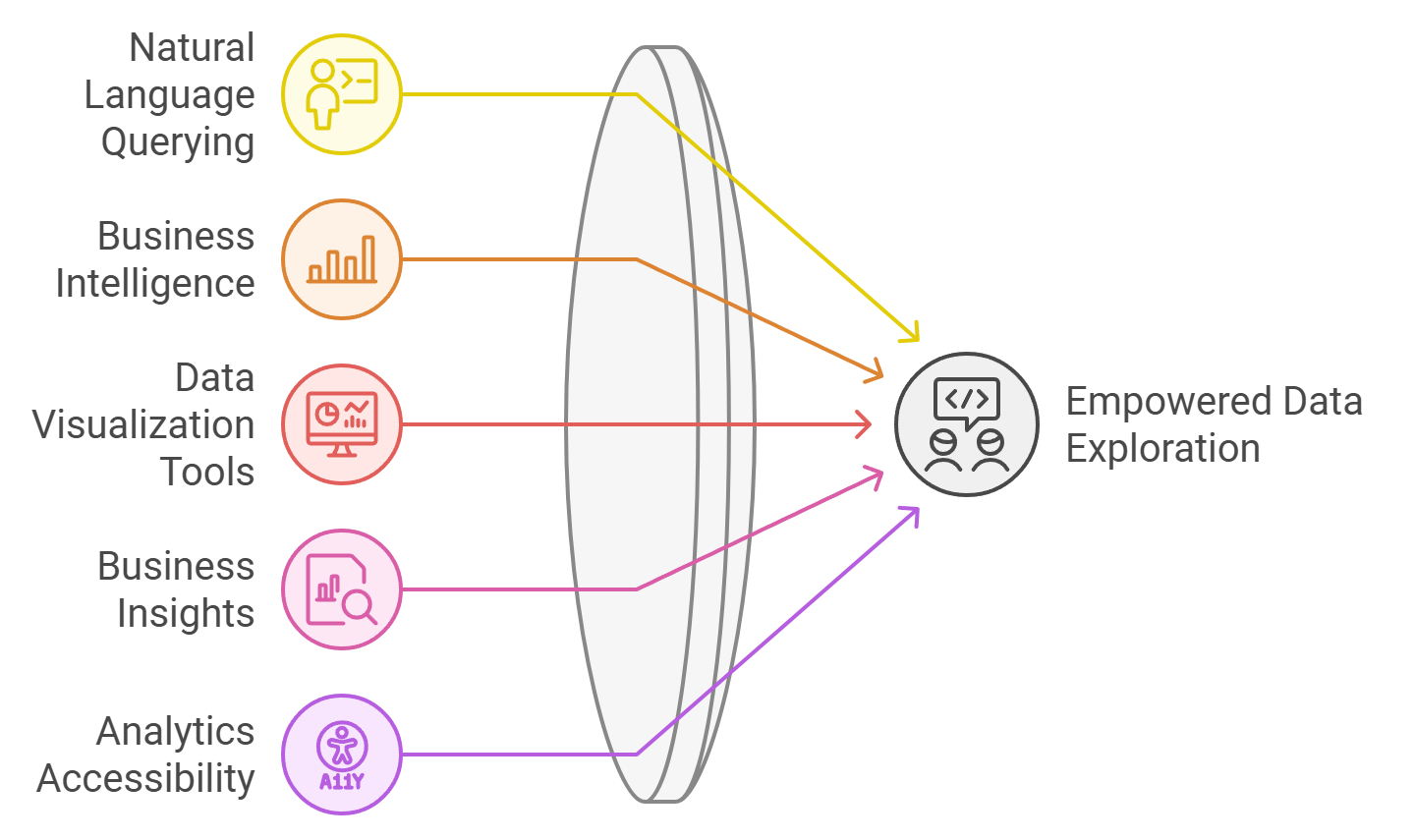
"With natural language querying, Microsoft Fabric democratizes data exploration, empowering users at all levels to uncover meaningful insights."
By simplifying data exploration and enhancing accessibility, Fabric ensures that your organization can fully leverage the power of intelligence and analytics.
Enhanced Collaboration and Governance
Role-Based Access Control
Managing access to sensitive data is critical for maintaining security and ensuring compliance. Microsoft Fabric provides robust role-based access control (RBAC), allowing you to define granular permissions for every user. This feature ensures that only authorized individuals can access specific datasets or perform certain actions. By assigning roles based on job responsibilities, you can safeguard your data while enabling team members to work efficiently.
Compliance with data privacy regulations becomes seamless with Fabric's built-in governance tools. Leveraging Azure's security infrastructure, Fabric incorporates advanced features like conditional access and service tags. These tools help you meet industry standards such as HIPAA and GDPR, reducing risks associated with data breaches. For example, healthcare organizations can securely handle patient information while adhering to strict legal requirements.
"Microsoft Fabric integrates advanced security measures to ensure data remains protected across the platform, enhancing trust and reliability."
With these capabilities, you can confidently share data across teams and external stakeholders without compromising security or compliance.
Collaborative Workspaces
Effective teamwork requires a shared environment where everyone can contribute to data projects. Microsoft Fabric offers collaborative workspaces designed to enhance productivity and streamline workflows. These workspaces allow your team to work together on data pipelines, analytics, and data warehouse tasks in real time. By centralizing efforts, you eliminate redundancies and foster a culture of collaboration.
Version control and change tracking are integral to these workspaces. Fabric automatically tracks modifications to datasets, ensuring transparency and accountability. You can review previous versions, identify changes, and revert to earlier states if necessary. This feature is particularly valuable when managing complex data pipelines or maintaining a large data warehouse. It ensures that your team stays aligned and minimizes errors during project execution.
"Collaborative workspaces in Microsoft Fabric empower teams to work cohesively, ensuring data accuracy and project efficiency."
By combining secure access with shared environments, Fabric transforms how you approach collaboration. These features enable you to build a unified strategy for managing data while fostering teamwork and innovation.
Cost Efficiency and Scalability
Pay-As-You-Go Pricing Model
Managing costs effectively is crucial for any organization. Microsoft Fabric offers a pay-as-you-go pricing model, which ensures you only pay for the resources you use. This flexibility allows you to scale your expenses based on your specific needs, avoiding unnecessary costs. Whether you are a small team with limited data requirements or a large enterprise handling massive datasets, this model adapts to your usage patterns.
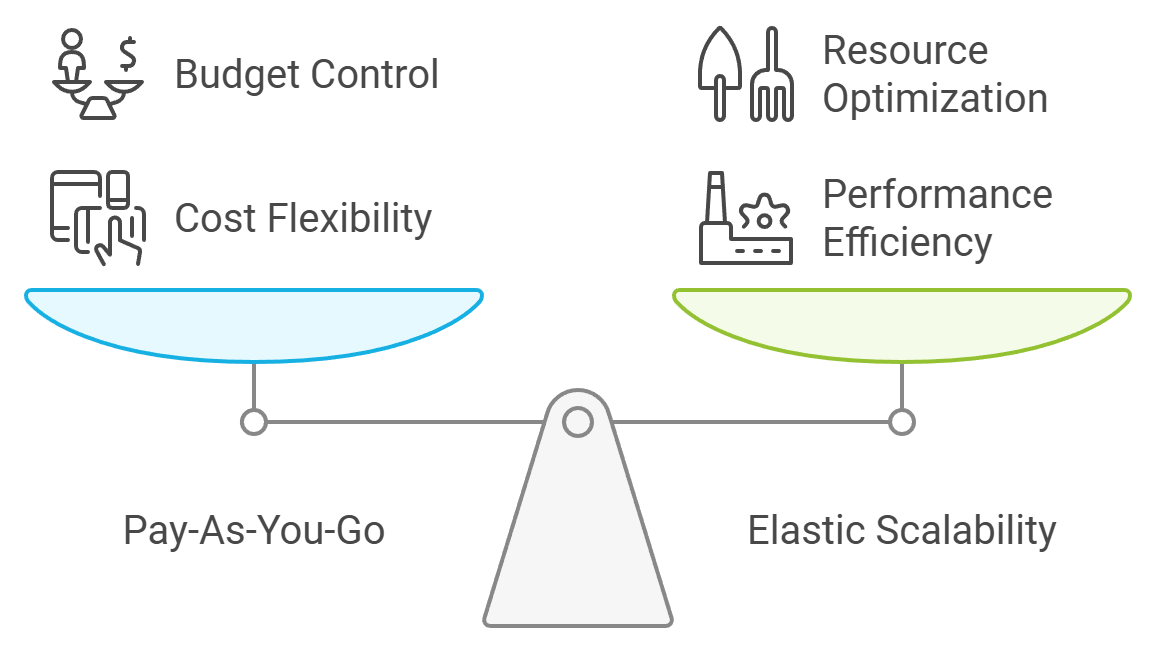
For smaller teams, this pricing structure minimizes upfront investments, making advanced analytics accessible without straining budgets. Larger organizations benefit from cost predictability, as they can allocate resources efficiently across departments. By aligning costs with actual usage, you gain better control over your budget while maximizing the value of your data operations.
"According to Forrester's Total Economic Impact study, companies adopting Microsoft Fabric experienced an impressive 379% return on investment, showcasing its cost-effectiveness and value."
This pricing approach not only optimizes expenses but also ensures that your organization can scale its data capabilities without financial constraints.
Elastic Scalability
Handling fluctuating workloads can be challenging, especially when dealing with large volumes of data. Microsoft Fabric addresses this challenge with elastic scalability, which automatically adjusts resources to match your workload demands. This feature ensures that your system performs efficiently, regardless of whether you are processing small datasets or managing complex analytics tasks.
Automatic scaling eliminates the need for manual intervention, saving time and reducing operational overhead. When workloads increase, Fabric allocates additional resources to maintain performance. During periods of low activity, it scales down to conserve resources. This dynamic adjustment ensures that you never overpay for unused capacity or experience performance bottlenecks.
Efficient resource allocation further enhances scalability. By optimizing how resources are distributed, Fabric reduces waste and ensures that every dollar spent contributes to meaningful outcomes. This capability empowers you to focus on extracting insights from your data rather than worrying about infrastructure limitations.
"Elastic scalability in Microsoft Fabric enables organizations to handle varying workloads seamlessly, ensuring optimal performance and cost efficiency."
With these features, you can confidently manage your data operations, knowing that your platform will adapt to your needs while keeping costs under control.
Microsoft Fabric brings together a powerful suite of tools that redefine how data professionals manage and analyze data. Its features and benefits simplify workflows, enhance collaboration, and empower you to make informed decisions faster. By unifying data storage, enabling real-time analytics, and integrating AI-powered insights, Fabric ensures you stay ahead in a data-driven world. This platform offers unmatched flexibility and scalability, making it an essential tool for modern organizations. Explore Microsoft Fabric today to unlock its full potential and transform your approach to data management.
See Also
Exploring Microsoft Fabric's Impact on Data Transformation
Achieving Proficiency in Microsoft Fabric Techniques
Data Analytics Mastery: Perspectives from an MVP Expert
